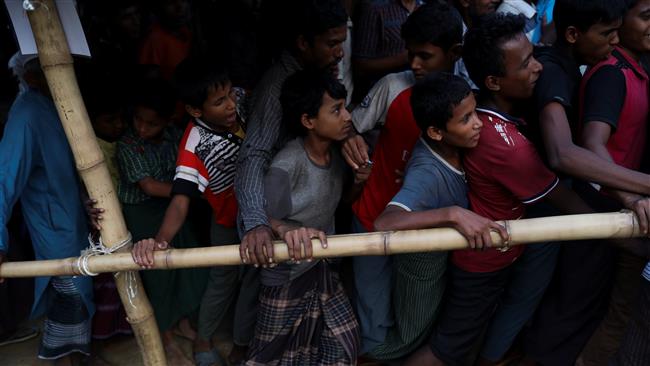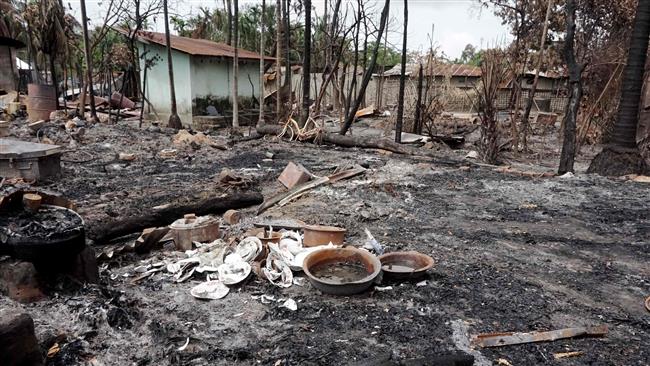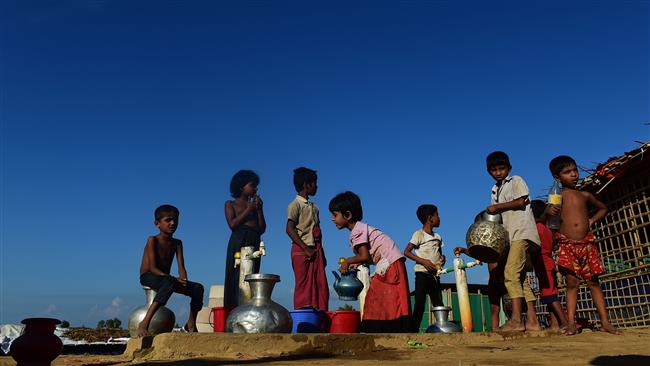Bangladesh, Myanmar reach deal to repatriate Rohingya refugees in 2 months
Bangladesh says it has reached a deal with Myanmar to repatriate Rohingya Muslim refugees within two months, as global pressure mounts on Myanmar for driving more than half a million members of the persecuted minority out of their homes.
“The return shall commence within two months” said Bangladesh in a statement issued shortly after its Foreign Minister A.H. Mahmood Ali and Myanmar’s Union Minister for the Office of the State Counselor Kyaw Tint Swe inked a deal, titled the Arrangement on Return of Displaced Persons from Rakhine State, in Myanmar’s capital of Naypyidaw on Thursday.
“This is a primary step. (They) will take back (Rohingya). Now we have to start working,” said the Bangladeshi top diplomat after the signing ceremony.
The agreement between the two neighbors was signed after weeks of negotiations on details of the accord, much of which has not yet been disclosed. However, Dhaka announced that a working group would be established within three weeks to agree the arrangements for the repatriation.
The office of Myanmar de facto leader Aung San Suu Kyi, however, said that the deal followed a formula set in a 1992 repatriation agreement inked by the two nations following an earlier surge of violence. Under that pact, Rohingya Muslims were required to provide residency documents, which few had, before being allowed to return to Myanmar.
More than 620,000 Rohingya Muslims have fled Myanmar to Bangladesh since late last year, when military soldiers and Buddhist mobs began vicious attacks on the minority Muslims in Rakhine. The crackdown on the Rohingya has intensified since August 25.
All along, government troops and the Buddhist mobs have been killing, raping, and arbitrarily arresting members of the Muslim community. They have also been setting the houses of the Muslims on fire in hundreds of predominantly-Rohingya villages in the northern parts of Rakhine, where nearly all the Rohingya reside.
On Tuesday, the Amnesty International said in a report that the discrimination against Rohingya had intensified considerably in the past five years so much so that it amounted to “dehumanizing apartheid.”
Myanmar’s government denies full citizenship to the Rohingya, branding them illegal immigrants from Bangladesh. Dhaka, in turn, regards the desperate refugees as Myanmarese. The Rohingya, however, track their ancestors many generations back in Myanmar.
The volatile Rakhine, located in Myanmar’s west, has been the scene of communal violence since 2012. Many Muslims had already lost their lives while tens of thousands had been displaced as a result of attacks by Buddhists long before the military began its crackdown in late 2016.
The UN has already described the Rohingya as the most persecuted community in the world, calling the situation in Rakhine similar to “a textbook example of ethnic cleansing.”
How US abuses its UN veto power to enable Israel’s genocidal war on Gaza
Iran refutes US, UK accusations over Ukraine war, West Asia conflicts
Pakistani town erupts in protest after terrorists kill scores of Shia Muslims
US senator threatens ICC with military action over Netanyahu sentence
Iran: ICC indictment of Netanyahu should have included 'genocide'
VIDEO | IAEA anti-Iran resolution
Iran urges pope to help end Israeli onslaught in Gaza
VIDEO | ICC's warrant against Netanyahu













 This makes it easy to access the Press TV website
This makes it easy to access the Press TV website